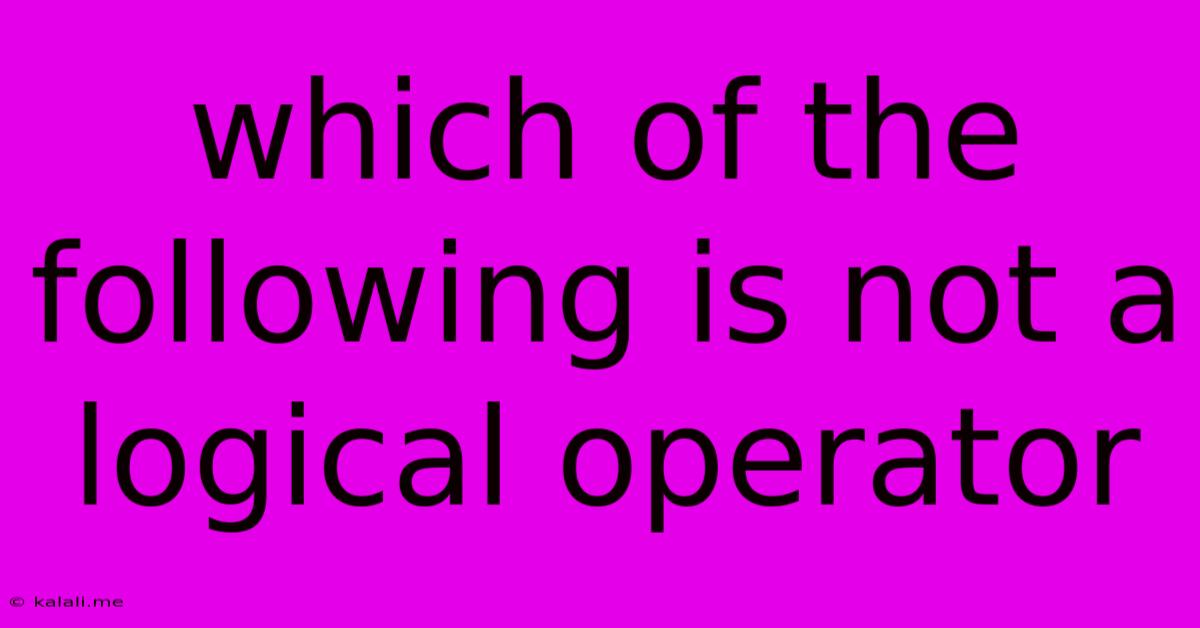Which Of The Following Is Not A Logical Operator
Kalali
Jun 12, 2025 · 2 min read

Table of Contents
Which of the Following is Not a Logical Operator? Understanding Boolean Logic in Programming
This article explores logical operators, a fundamental concept in programming and computer science. We'll define what logical operators are, list common examples, and identify which of a given set isn't a logical operator. Understanding this distinction is crucial for writing accurate and efficient code.
What are Logical Operators?
Logical operators, also known as Boolean operators, are symbols or keywords used to combine or manipulate Boolean values (true or false). They determine the overall truth value of a complex expression based on the truth values of its individual components. These operators are essential for controlling program flow, making decisions, and evaluating conditions. They're used extensively in conditional statements (if, else if, else), loops (while, for), and Boolean expressions.
Common Logical Operators:
Most programming languages employ a similar set of logical operators. The most frequently encountered are:
- AND (&& or &): Returns
trueonly if both operands aretrue. - OR (|| or |): Returns
trueif at least one operand istrue. - NOT (!): Inverts the truth value of an operand. If the operand is
true, it returnsfalse, and vice versa.
Identifying the Non-Logical Operator:
Let's consider a hypothetical example: Which of the following is NOT a logical operator: +, &&, ||, !?
The answer is +. The + symbol is an arithmetic operator, used for addition. It performs a mathematical operation, not a logical one. The other three symbols (&&, ||, !) are standard logical operators used to evaluate Boolean expressions.
Beyond the Basics: Other Operators and Considerations:
While AND, OR, and NOT form the core of Boolean logic, some programming languages include additional logical operators or variations. For instance, you might encounter:
- XOR (exclusive OR): Returns
trueif exactly one operand istrue. - Short-circuiting: Some languages implement short-circuiting behavior in their logical operators. For example, in
A && B, ifAisfalse,Bis not evaluated because the entire expression will befalseregardless ofB's value. This can improve performance.
Understanding the nuances of logical operators, including potential variations between languages, is important for writing clear, concise, and efficient code. Incorrect use of logical operators can lead to unexpected program behavior and logic errors.
Conclusion:
Logical operators are fundamental building blocks in programming. Knowing how to distinguish them from other types of operators, such as arithmetic operators, is essential for competent coding. This knowledge allows for precise control over program execution and helps in crafting efficient and reliable software. By understanding their functionality and potential variations across programming languages, you can write more robust and effective code.
Latest Posts
Latest Posts
-
Distance Of A Penalty Kick Soccer
Jun 13, 2025
-
Earth Is Divided Into How Many Time Zones
Jun 13, 2025
-
What Are The First 5 Multiples Of 9
Jun 13, 2025
-
Singly Linked List Vs Doubly Linked List
Jun 13, 2025
-
Queen Mary University London Acceptance Rate
Jun 13, 2025
Related Post
Thank you for visiting our website which covers about Which Of The Following Is Not A Logical Operator . We hope the information provided has been useful to you. Feel free to contact us if you have any questions or need further assistance. See you next time and don't miss to bookmark.